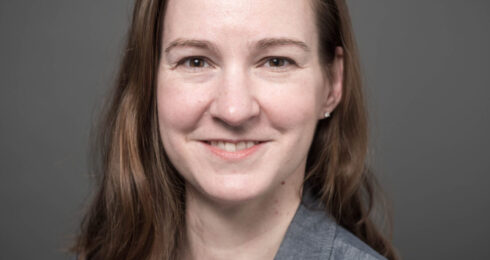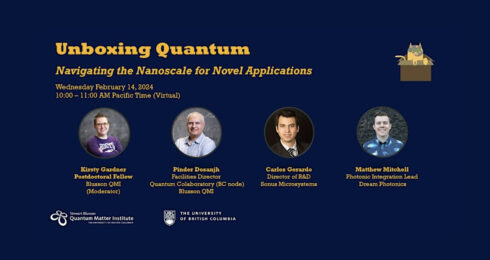Pictured: students participate in a quantum computing outreach program. Image source: Haris Amiri/UBC Geering Up.
A team focused on outreach in quantum computing, led by Lukas Chrostowski, Professor in UBC’s Department of Electrical and Computer Engineering, was awarded “Best Paper” in the Quantum Education Track for their work, Educational Resources for Promoting Talent in Quantum Computing, as part of the Institute of Electrical and Electronics Engineers (IEEE) International Conference on Quantum Computing and Engineering (QCE20). The team, which includes paper authors Parham Pashaei, Haris Amiri, Rafael Haenel, Pedro Lopes, and Chrostowski, has been working to broaden access to quantum computing education, including exposure to concepts in quantum technology during the K-12 years.
The paper also provides a toolkit for educators to help them effectively introduce engineering and physics-based concepts to children. Making quantum computing accessible to non-experts, including kids, requires a great deal of creativity. The Diversifying Talent in Quantum Computing (DTQC) program at UBC—led by Chrostowski, with co-investment from the Canadian Digital Technology Supercluster, and in partnership with colleagues in academia (UBC Geering Up Engineering Outreach) as well as from industry (D-Wave Systems and Microsoft)—brings quantum computing to kids through quantum kits and curricula teachers can adapt by age and grade. Programming is uniquely designed to nurture young people’s interest in quantum information topics through their formative years. The program also includes summer educational programming, and self-guided tools that gamify learning and teach young learners physics and coding on their terms.
Lead author Pashaei is the Curriculum Development Lead on the DTQC program; an avid community-builder, he has been involved in a range of outreach programs along with his colleagues, including Haris Amiri, Project Manager and UBC Geering Up Outreach Coordinator, as well as curriculum development volunteers including Joint PhD student Rafael Haenel and Project Manager Pedro Lopes. From SBQMI’s QuEST Program to developing science communication initiatives with the CREATE program, Pashaei is an emerging leader in quantum computing education.
A challenge in the field of quantum computing is its rapid growth, and the need to develop talent. To create a wider pipeline into the field, outreach leads must target students before they begin making academic choices that narrow their educational paths. These programs also offer an opportunity to connect with students who might not see themselves in computing fields but who have the capacity for programming, materials design, or applications. As technology plays a bigger and more influential role in our daily lives, it will be critical that the technologies of the future are developed by a diverse workforce.
The DTQC team have been working to appeal to students across their education in a number of ways, including the NSERC-funded CREATE program, which pairs graduate students at several BC universities with opportunities to learn about quantum computing in both academic and corporate environments. Canada, and British Columbia in particular, is emerging as a leader in the quantum information sector, and a community of researchers have been working to establish training programs that lead to careers in the industry.
The quantum information field in BC is small, and professors work across institutional lines to collaborate and build local networks of business and academic partnerships. Chrostowski, a leader in the development and application of integrated silicon photonics devices, is eager to see an increase in the number of women, Indigenous youth, and other underrepresented groups enrolling in physics and engineering programs in support of the local quantum computing effort; to that end, the programs the team offers engage in a cycle of feedback that enables the team to refine the content in order to continuously improve its accessibility, sensitivity, and reach.
“Given that quantum computing is a growing technology field for which we will need numerous trainees over the next 20 years, my hope is that our efforts towards early education will create a pipeline of talent for our university research groups and for the quantum computing industry,” said Chrostowski. “The team has already delivered an online GeeringUp summer camp and have reached 265 youth in grades 6-12, with 47% female participation, and I look forward to welcoming some of these high-school students into the undergraduate and graduate programs at UBC.”
As part of QCE20, the team presented a talk on their paper, and were involved in a part of a workshop series hosted by UVic and collaborators Honeywell Quantum Solutions and HighTechQ, a Technology Skills Incubator for high school students.
Related:


